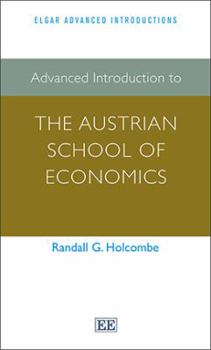Advanced Introduction to the Austrian School of Economics
Select Format
Select Condition 
Book Overview
Erudite, accessible and lucidly written, this book provides both a stimulating introduction and excellent summary of the core principles, ideas and diversity of modern Austrian economics. The Austrian school was well within the mainstream of economic thought by the 1930s, but fell from prominence by the middle of the twentieth century. There was a renewed interest in the Austrian school's ideas beginning in the 1970s which has accelerated recently, but many economists do not have a good understanding of the distinguishing values and characteristics that set it apart. This volume is aimed at readers who already have a familiarity with economic analysis, but would like to know more about the distinct philosophies of the Austrian school. The book succinctly but thoroughly covers all the major issues including:
the market process
decentralized knowledge and the role of firms and markets
economic calculation
money, banking and business cycles
the resurgence of the Austrian school.





